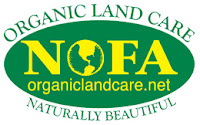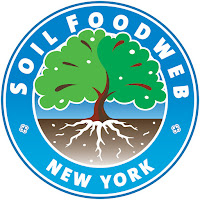1.
Please describe your business in 50 words or less.
 Osborne Organics consults with
local, state, and federal agencies as well as universities and other
institutional clients to transition landscapes to natural, organic practices
and protocols with a specialty in natural turf. Osborne Organics has developed
the “Systems Approach to Natural Turf Management” and offers professional training
around the country.
Osborne Organics consults with
local, state, and federal agencies as well as universities and other
institutional clients to transition landscapes to natural, organic practices
and protocols with a specialty in natural turf. Osborne Organics has developed
the “Systems Approach to Natural Turf Management” and offers professional training
around the country.
2.
What is the state of the organic gardening industry? Where do you
see the greatest growth and what’s driving it? I believe the organic
gardening, landscape, and turf industries are strong and continually growing.
We are currently experiencing a tipping point, or change in the marketplace,
that we have pointed to for the past twenty years. Organic practices are no
longer on the fringe, but are now mainstream.
The concept of the organic landscape
began with the homeowner (residential property) some time ago. It is now widely
being considered as the management protocol of choice for larger properties, both
commercial and private. When that segment is combined with a strong interest by
the municipal sector for organic practices, products, and protocols for playing
fields and public spaces where children play, we can now point towards some
significant numbers.
This is being driven by the public’s
perception regarding the dangers of pesticides. We are seeing the results of
tireless efforts by many advocates over the years who have worked at the
grassroots level to change people’s minds regarding the use of synthetic water
soluble fertilizers and chemical pesticides.
It is the change in the marketplace
that continues to move all of this forward. In addition to that, legislation is
now being enacted around a variety issues at the state, county, and local level
regarding restrictions of different types on pesticides and synthetic
fertilizer use.
There is growing interest across all
segments of society regarding organic practices. They include residential
properties that range from small homes to large estates, commercial properties,
hotels, resorts, colleges, universities, and golf courses. The main theme
across them all is the desire to have a healthier environment for work and
play.
 There is a geographical component to
the acceptance of organic practices. There is no question that Massachusetts,
Connecticut, and Westchester County in NY are the birthplaces of organic land
care. We are excited to see the growing interest in New Jersey, the mid-
Atlantic, particularly Maryland, the upper Midwest, the Pacific Northwest, and
Southern California. Accredited Organic Land Care Professionals (AOLCPs) can be proud knowing that they are part of an
organization that worked from the beginning with others to lay the groundwork
to effect tremendous change.
There is a geographical component to
the acceptance of organic practices. There is no question that Massachusetts,
Connecticut, and Westchester County in NY are the birthplaces of organic land
care. We are excited to see the growing interest in New Jersey, the mid-
Atlantic, particularly Maryland, the upper Midwest, the Pacific Northwest, and
Southern California. Accredited Organic Land Care Professionals (AOLCPs) can be proud knowing that they are part of an
organization that worked from the beginning with others to lay the groundwork
to effect tremendous change.
3.
What are some of the most common challenges professionals face in
caring for the land organically and what approach do you take to solving them
From my perspective, the problems
are not product oriented entirely. There are limitations in materials that we
can use, but for the most part most resources are available to us. The organic
product industry has evolved to a point where we now have access to
state-of-the-art fertility and soil health inputs that focus on the biomass
more than the plant. Knowing that a natural system in many cases can manage
itself, the product becomes somewhat secondary.
We now have a variety of organic
insecticides and fungicides should we need to intervene. For those that manage
turf grass and hardscape, a limiting factor can be minimal, cost-effective
product to address weeds.
Developing a tolerance, or weed
threshold, is critically important in all aspects of the managed landscape. We
need to move beyond the concept of a monoculture. That being said, all organic
landscape professionals at some point in time are faced with managing a misplaced
plant effectively for a client. It can be a challenge, but is getting easier as
new materials are developed.
The greatest challenge in my mind is
the comfort of organic professionals to communicate to others what we believe
in and do. Many of us have adopted these practices to reduce the use of
pesticides, others to reduce synthetic runoff, and others because they have
always done it that way. Some of us came from the conventional industry and
have adopted organic management practices as a result of what we experienced
firsthand.
The driving factor for me is the
reduction and elimination of pesticide use in the landscape. Contrary to
information put forth by the conventional product industry, landscapes do not
get better with the use of synthetic materials. I know firsthand that movement
towards an organic approach immediately improves the landscape. There is
absolutely no question that the organic landscape looks, performs, and pleases
to a far greater degree than its chemical counterpart.
4.
What advice do you have for conventional land care professionals who
are considering transitioning to organic?
Forward thinking conventional
practitioners are beginning to seek out opportunities to understand and learn
about organic lawn and land care. It does take the change in market demand to
bring many of them to the table. They may not approach organic from the same
perspective that we do. It might be, and probably is, more rooted in financial
interests, but whatever it takes is fine with me. I firmly believe that the
more widespread adoption of organic lawn and land care practices and protocols
on a national level is simply limited by the lack of education about how it
needs to be approached.
 CT NOFA's Organic Land Care Program has responded to the
challenge for the past fifteen years to meet that demand. When I interact with
the conventional industry, I make them aware that there is a learning curve and
that it is to their best interest to seek out education. Because what we do is
not just putting down product, those that try the product swap-out will usually
fail. In addition to the initial learning experience, keeping abreast of
changes with continuing education is, and will be, critically important for all
of us.
CT NOFA's Organic Land Care Program has responded to the
challenge for the past fifteen years to meet that demand. When I interact with
the conventional industry, I make them aware that there is a learning curve and
that it is to their best interest to seek out education. Because what we do is
not just putting down product, those that try the product swap-out will usually
fail. In addition to the initial learning experience, keeping abreast of
changes with continuing education is, and will be, critically important for all
of us.
5.
How do you consider your business to be part of the solution to
environmental degradation and overuse of synthetic fertilizers and pesticides?
How do you educate your clientele?
Osborne
Organics works with a diverse group of clients that range from individual
landscape professionals to the federal government and everything in between. We
would like to think that in some small way we can influence the market by
showing that the debate about the safety and dangers of pesticides is now less
relevant because we have proven that alternative non-chemical strategies can
work and meet expectations. With strategies that work on one hand and the
precautionary principle on the other, it is difficult not to embrace
alternatives.

















